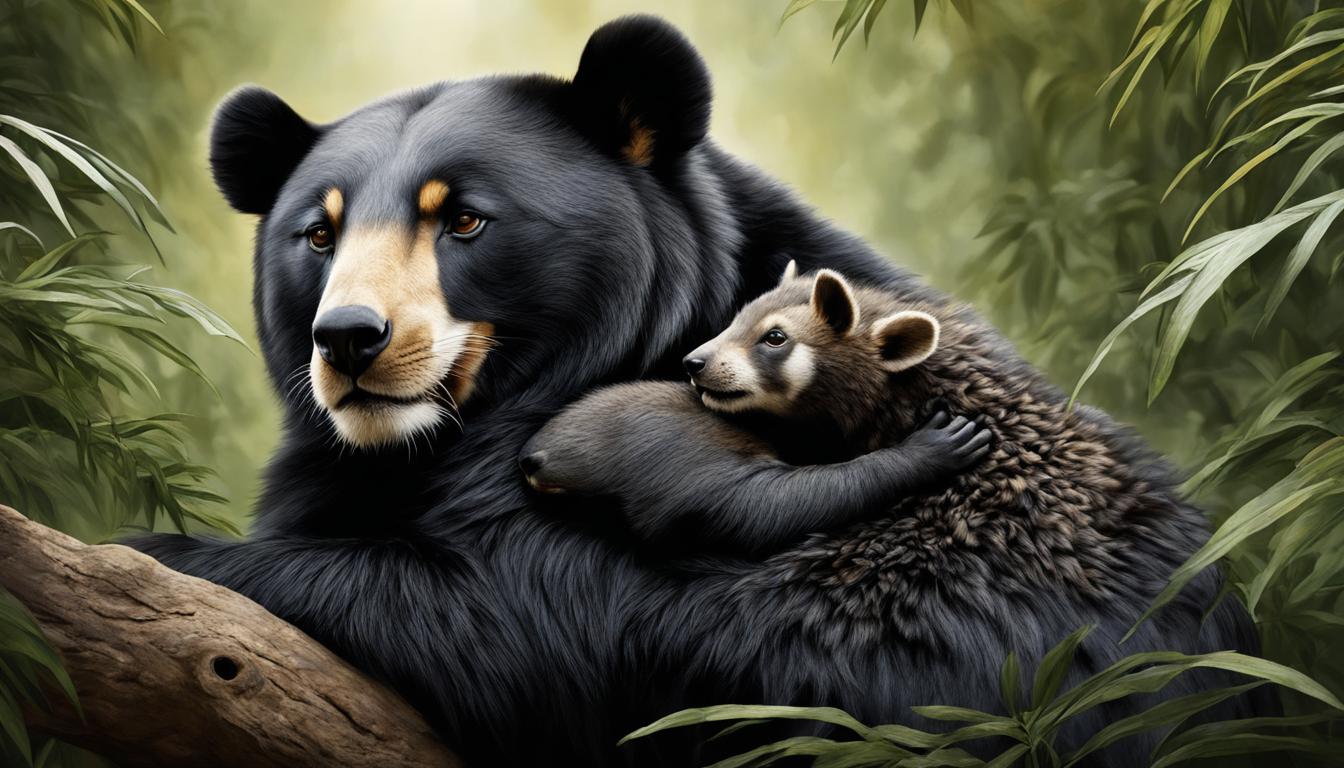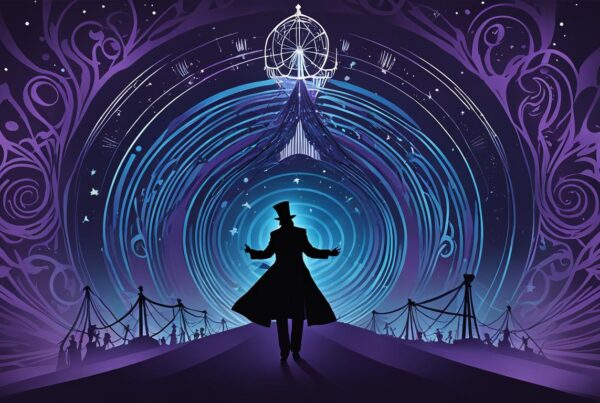In this audiobook review, we explore the fascinating world of animal emotions and what they tell us about ourselves through Frans de Waal’s book, Mama’s Last Hug. As an acclaimed author and expert in animal behavior, de Waal presents compelling research and real-life stories that illuminate the rich emotional lives of animals, from primates to lesser-known creatures.
Through his work, de Waal prompts readers to examine the parallels between animal and human emotions, offering a profound understanding of the emotional connections and experiences that we share with our animal counterparts. Join us as we dive into the thought-provoking world of Mama’s Last Hug and gain new insights into our understanding of humanity.
Key Takeaways
- Frans de Waal’s book Mama’s Last Hug offers profound insights into the emotional lives of animals
- The book explores the parallels between animal and human emotions, prompting readers to reflect on their own emotional connections and experiences
- De Waal’s work suggests that empathy plays a crucial role in establishing emotional connections between individuals, both within animal communities and human societies
- Mama’s Last Hug invites readers to reflect on the ethical implications of our growing understanding of animal emotions, raising important questions about animal welfare and treatment
- The audiobook version of Mama’s Last Hug delivers excellent narration and high production value, enhancing the listening experience
About the Author
Frans de Waal is an esteemed biologist and primatologist whose expertise spans across the fields of animal behavior, psychology, and evolution. He is the C. H. Candler Professor at Emory University and is renowned for his groundbreaking research on the social and emotional lives of animals, particularly primates. Mama’s Last Hug is one of his many publications in this area, drawing upon his extensive experience and knowledge to shed light on the intricate world of animal emotions.
Background
De Waal has an impressive background in the field of animal behavior and primatology. He holds a PhD in biology from the University of Utrecht in the Netherlands and has also been affiliated with various research institutions, including the Yerkes National Primate Research Center in Atlanta, Georgia.
| Education: | PhD in biology from the University of Utrecht |
|---|---|
| Academic Affiliations: | C. H. Candler Professor at Emory University Senior Fellow of the Center for Primatology at the University of Wisconsin-Madison |
| Research Expertise: | Animal behavior, psychology, and evolution, with a focus on primates |
De Waal’s work has gained worldwide recognition and numerous awards, such as the Benjamin Franklin Award in 2013 for The Bonobo and the Atheist. Additionally, he has been invited to give TED talks on his research and has authored several best-selling books on animal behavior and emotions.
Overview of Mama’s Last Hug
Mama’s Last Hug: Animal Emotions and What They Tell Us about Ourselves by Frans de Waal is an enthralling exploration of animal emotions and their parallels with human emotions. This book offers an insightful look into the emotional lives of animals, delving deep into fascinating research, and real-life stories to illustrate the rich diversity of the animal kingdom. The central focus of the book aims to address questions about animal emotions and their impact on our understanding of our own emotional lives.
Frans de Waal adopts a novel approach, using captivating anecdotes and scientific research to reveal the complex behavioral patterns of animals. The book covers a broad range of topics, including the incredible emotional intelligence exhibited by primates, the fascinating findings on other creatures’ emotional awareness, the evolutionary origins of emotions, and ethical considerations raised by this emerging field of study.
Mama’s Last Hug is an eye-opening and thought-provoking book that offers readers a deeper understanding of animal emotions. The book opens doors to new horizons of research on the subject and unlocks great potential for continued learning. Throughout the book, Frans de Waal presents key themes and concepts that showcase the intricate relationships between animal and human emotions. After reading Mama’s Last Hug, you are likely to have a new worldview on how animals and humans relate emotionally.
Table of Contents
| Chapters | Section Title |
|---|---|
| 1 | The Depths of Animal Emotions |
| 2 | The Dawn of Animal Emotions |
| 3 | Comparing Animal and Human Emotions |
| 4 | The Incredible World of Primates |
| 5 | Emotional Connections Beyond Primates |
| 6 | The Evolutionary Roots of Emotion |
| 7 | The Ethical Considerations |
| 8 | The Role of Empathy in Animal Emotions |
| 9 | Narration and Production Value |
| 10 | Audience Response and Reviews |
Exploring Animal Emotions
Frans de Waal sheds light on the intricate emotional lives of animals and how they mirror our own. His research provides fascinating insights into the emotional capacity of animals and their remarkable ability to form meaningful relationships. These real-life stories illustrate the depth of emotion and empathy present in creatures we once believed were devoid of feeling.
From elephants mourning their dead to chimpanzees expressing joy and love, the parallels between animal emotions and our own are undeniable. De Waal’s work challenges us to rethink our assumptions about the vast emotive range of animals and to question the ethical implications of animal welfare.
Animal Emotions: A Comparative Study
| An Animal’s Emotion | Parallels to Human Emotions |
|---|---|
| Lioness grieving the loss of her cub | Comparable to human maternal grief |
| Dolphin expressing joy and excitement | Comparable to human joy and excitement |
| Gorilla comforting her distressed child | Comparable to human parental nurturing |
| Rats exhibiting empathy | Comparable to human empathy |
By drawing parallels between animal emotions and our own, we can gain a better understanding of the evolutionary roots of our emotive capacity. Additionally, we can appreciate the full spectrum of emotions that animals experience, deepening our connection and empathy with the natural world.
The Incredible World of Primates
Primates are among the most fascinating creatures we share our planet with. Their high level of intelligence and emotional complexity has long been the focus of scientific research. Primates are known to exhibit a wide range of emotions that are similar to those of humans, including love, fear, anger, sadness, and joy.
The study of primates has given us a deeper understanding of emotional intelligence and how it impacts social behavior and communication. Through observing their interactions with one another, researchers have discovered that primates possess a level of emotional intelligence that is similar to that of humans.
For instance, studies have shown that primates are capable of exhibiting empathy, self-awareness, and even a sense of fairness. These qualities are often associated with high emotional intelligence in humans and provide fascinating insights into the emotional lives of primates.
Did you know? Some studies have shown that primates have the ability to recognize themselves in mirrors, indicating that they possess self-awareness and a sense of identity.
The image above shows a group of primates engaging in playful behavior, highlighting the joy and social bonds that exist within primate communities.
Unveiling the Emotional Lives of Other Animals
While primates are known for their high emotional intelligence, many other animals exhibit emotional awareness as well. In Mama’s Last Hug, Frans de Waal explores these fascinating emotional connections found across the animal kingdom.
Did you know that rats have been observed showing empathy towards other rats in distress? They have been known to comfort each other, even when there is no direct benefit to themselves. Elephants have also been observed exhibiting grief and mourning rituals for their deceased herd members. These behaviors suggest a deep understanding of emotional connections and the ability to perceive emotional states in others.
Other Examples of Emotional Awareness
| Animal | Emotional Behavior |
|---|---|
| Dogs | Can show signs of jealousy and guilt |
| Cows | Have been observed comforting other cows who are distressed or stressed |
| Octopuses | Display complex social behaviors, including playful interactions |
| Crows | Can hold grudges against humans who have wronged them |
These examples and more demonstrate the richness of emotional awareness found in creatures beyond just primates. By expanding our understanding of animal emotions, we can gain greater insight into our own complex emotional lives, and to our relationships with other beings sharing this planet with us.
The Evolutionary Roots of Emotion
Emotions are universal among animals, including humans. Despite the overwhelming presence of emotions, scientists have struggled to understand their origins. Frans de Waal’s Mama’s Last Hug: Animal Emotions and What They Tell Us About Ourselves explores the evolutionary origins of emotions and their role in shaping animal behavior and social structures.
Researchers theorize that emotions possess adaptive advantages, granting an organism the ability to react and adapt to stimuli more efficiently. For instance, fear helps animals avoid danger, while love facilitates social bonds that enhance their chances of survival. The evolutionary advantages of emotional intelligence can be observed in the behavior of many social animals, including primates, elephants, and dogs.
Emotional intelligence equips animals with an array of skills, including empathy, cooperation, conflict resolution, and moral reasoning. These abilities enable animals to make intelligent decisions, adapt to their environment, and coexist harmoniously with others. By unraveling the evolutionary roots of emotions, Mama’s Last Hug offers a unique perspective on the complex emotional lives of animals and our shared emotional heritage.
Ethical Implications of Animal Emotions
As we delve deeper into animal emotions and their parallels with our own, we cannot ignore the ethical considerations that arise. The growing understanding of animal emotions has significant implications for animal welfare and the broader debate on the rights and treatment of sentient beings.
The recognition of animals as emotional beings challenges the traditional viewpoints on animal use and exploitation. Ethical considerations surrounding animal captivity, experimentation, and slaughter have come under scrutiny with the increasing awareness of their emotional lives.
Animal rights activists have long advocated for the recognition of animals as sentient beings capable of feeling emotions such as pain, joy, and grief. The acknowledgement of animal emotions further amplifies their campaign, providing scientific evidence to support their claims.
However, the implications go beyond the treatment of domestic animals and livestock. Our growing understanding of animal emotions also raises questions about the treatment of animals in the wild, particularly those affected by human activities such as deforestation and pollution.
The Intersection of Science and Ethics
The discovery of animal emotions also highlights the intersection of science and ethics. While research into animal emotions deepens our understanding of the natural world, we must also be cognizant of the ethical implications of our discoveries.
The use of animals in research has long been contentious, with animal rights activists arguing against the exploitation of animals for human benefit. The recognition of the emotional lives of animals adds another layer of complexity to this debate, inviting discussions on the ethical treatment of research animals and how their emotional welfare can be protected.
Moving Forward
The recognition of animal emotions presents a unique opportunity for us to reevaluate our relationship with animals and the natural world. As we continue to unravel the mysteries of animal emotions, it is essential to consider the ethical implications of our discoveries and strive towards a more compassionate future for all sentient beings.
The Role of Empathy in Animal Emotions
Empathy plays a critical role in establishing emotional connections between individuals, including animals. By understanding the emotions of others, animals can form social bonds and maintain healthy relationships within their respective communities.
Frans de Waal, in Mama’s Last Hug, presents compelling examples of empathy in animals, including elephants mourning their dead, chimpanzees consoling distressed peers, and rats displaying empathy towards their fellow rodents in pain.
This emotional intelligence is not limited to the more intelligent or social animals. Even creatures with simpler nervous systems such as insects have displayed empathetic behaviors in studies. For example, when a bee is exposed to a distressed hive member, they will often groom or attempt to revive their distressed companion.
These examples showcase the depth of emotional complexity present in animal communities and the power empathy has in facilitating emotional connections and understanding between individuals.
Mama’s Last Hug: Narration and Production Value
When it comes to audiobooks, narration and production quality are just as crucial as the content itself. In the case of Mama’s Last Hug, the audiobook version is a well-executed production that adds depth and emotion to the already thought-provoking material.
The audiobook is narrated by Xe Sands, a seasoned voice actor with over 200 audiobook credits. Sands delivers a compelling performance, capturing the essence of Frans de Waal’s work and conveying the emotional weight of the stories and research presented.
Production-wise, Mama’s Last Hug is a stellar example of what an audiobook experience should be. The mixture of music, sound effects, and Sands’ narration blend seamlessly, creating an immersive auditory experience for the listener. The audiobook producers clearly understood the power of audio to add an extra layer of depth to the listening experience.
In summary, Mama’s Last Hug’s audiobook version is a high-quality production that adds value to the already compelling content. The narration is expertly delivered, and the production value makes for an immersive listening experience.
Audience Response and Reviews
As Mama’s Last Hug continues to captivate audiences with its exploration of animal emotions, we turn to reviewer feedback to better understand its impact. The book has received overwhelmingly positive reviews from both scientific and general readers.
One reviewer praises the book, stating, “Mama’s Last Hug is a triumph in exploring the emotional lives of animals and providing insight into the complexity of their relationships. It is both informative and thought-provoking, and a must-read for anyone interested in animal behavior.”
Another reader shares their personal reflection, saying, “Reading Mama’s Last Hug has opened my eyes to the emotional depth of animals and their ability to form meaningful connections. It has also made me question our treatment of animals and our assumptions about their intelligence and capabilities.”

The audience response to Mama’s Last Hug highlights the book’s relevance and importance in understanding the emotional lives of animals and its implications for our relationship with them.
Conclusion
Frans de Waal’s Mama’s Last Hug: Animal Emotions and What They Tell Us about Ourselves offers an eye-opening exploration into the emotional lives of animals and their parallels with our own human nature. Through compelling research and real-life stories, de Waal captures the depth and complexity of animal emotions, from the incredible world of primates to the surprising emotional awareness of other creatures.
Beyond its thought-provoking content, the audiobook version also delivers high-quality narration and production value, enhancing the listening experience. The book raises important ethical considerations that challenge us to reflect on the treatment of sentient beings and the role of empathy in emotional connections between individuals and within animal communities.
Overall, Mama’s Last Hug offers profound insights into the evolutionary origins and adaptive advantages of emotions, and their significance in shaping behavior and social structures. This audiobook is a must-read for anyone interested in a deeper understanding of animal emotions and their implications for our understanding of humanity.



